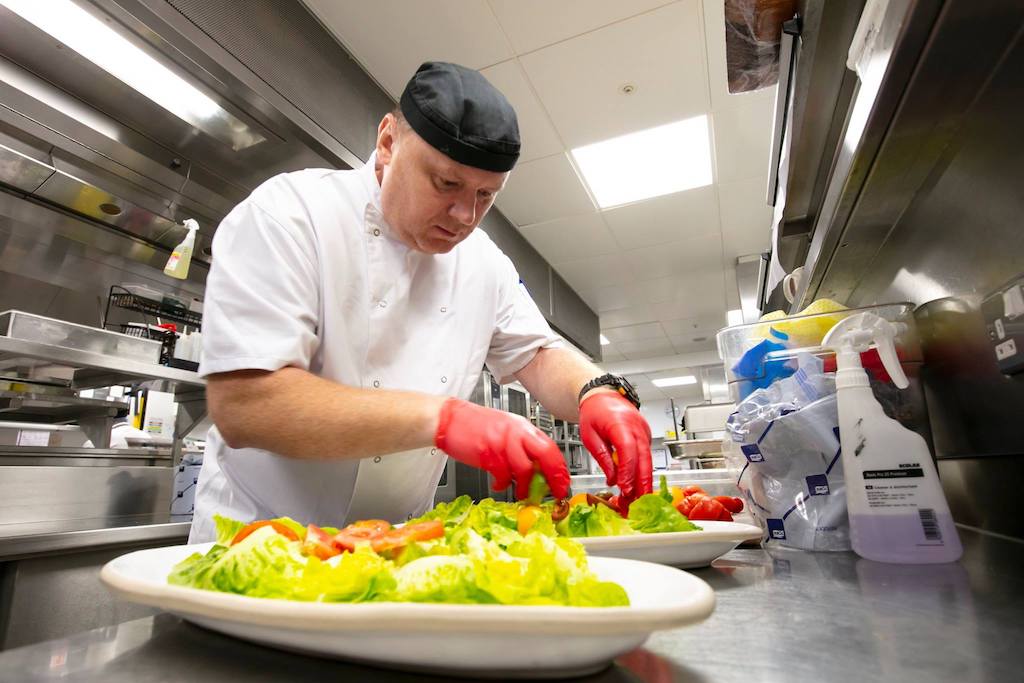British Catering Giant Compass Group To Replace 40% Animal Proteins By 2030
4 Mins Read
Compass Group is planning to replace 40% of the animal-based foods throughout its supply chain with alternative proteins as part of its net-zero emissions campaign. The British multinational foodservice conglomerate also pledged to halve food waste and source a greater share of its produce from regenerative agriculture to reach its goal.
Compass Group, the biggest contract foodservice company in the world owning the likes of Chartwells, Eurest and Levy Restaurants, has committed on Monday (May 10) to ramp up the share of alternative proteins in its supply chain in order to reach carbon neutrality. It has set out to slash at least 65% of its carbon footprint by the end of the decade, a significant portion of which will come from displacing 40% of animal-based proteins with alternative sources such as plant-based meats.
The firm has set the timeline for a 25% switch away from animal-based proteins for 2025, before reaching the 40% figure five years later. Plant-based and non-animal sources of protein are far more carbon-friendly than meat and dairy-heavy diets because animal-based foods use up huge amounts of land and water resources.

With animal agriculture responsible as much as 18% of the world’s greenhouse gas emissions, scientists have urged for a mass shift to plant-forward or flexitarian diets. According to a G20 food footprint report, 40% of the total global carbon budget for food could be free up if the world’s biggest economies made a switch to flexitarianism.
We believe it is our responsibility to contribute towards a future of sustainable food production.
Robin Mills, Managing Director, Compass Group U.K. & Ireland
The remainder of Compass Group’s carbon footprint will be offset by supporting a number of “high-quality U.K. and Ireland-based carbon removal projects”, such as peatland restoration and reforestation in rural areas.
“Once we have significantly reduced our carbon emissions by 2030, we will evolve our programme from compensating to neutralising any remaining carbon emissions,” explained the company, who also offers cleaning and facility management services in addition to producing meals in offices, factories, schools, universities, hospitals, correctional institutions and sports venues.
The plan is part of the company’s science-based targets that it has laid out in accordance with the United Nations’ Race to Zero campaign, which pushes businesses to align with the goal of limiting global heating to 1.5 degrees Celsius.

Another part of the Compass Group’s promise to “help build a more sustainable food system” is slashing food waste by 50% and purchasing at least 70% of its fresh produce from regenerative agriculture sources by 2030. It will additionally place a greater focus on using local, seasonal ingredients to create plant-forward dishes for their clients in the years to come.
Once we have significantly reduced our carbon emissions by 2030, we will evolve our programme from compensating to neutralising any remaining carbon emissions.
Compass Group
Other measures that will be taken include using 100% renewable energy by 2022, switching to using only reusable or recyclable materials in its packaging by 2023 and changing its entire transportation fleet to electric-powered vehicles the year after that. It is currently in the process of phasing out disposable plastic and polystyrene dishware and cutlery before July this year.
Robin Mills, managing director of Compass Group U.K. and Ireland, claims the company is the first in the country’s foodservice industry to target carbon neutrality. Other large British food businesses who have made various plant-based commitments as part of their net-zero plans include retailers like Co-op, Tesco, M&S and Asda.
“We believe it is our responsibility to contribute towards a future of sustainable food production and regenerative agricultural principles and practices, and a commitment to climate net zero is an important milestone,” said Mills. “I couldn’t be more excited for the future of foodservice.”
Lead image courtesy of Eurest.




